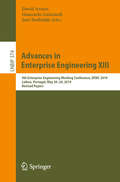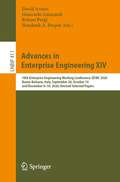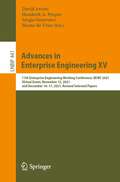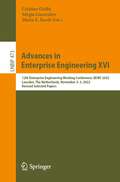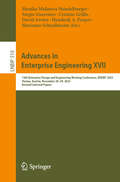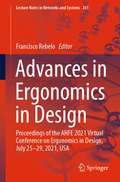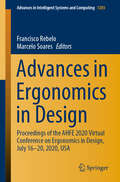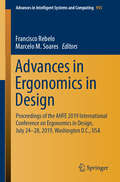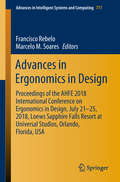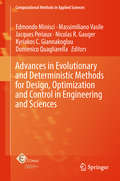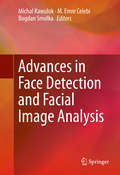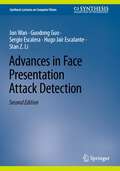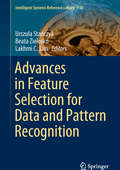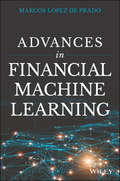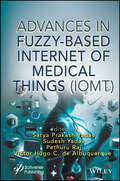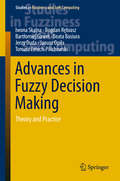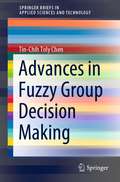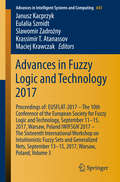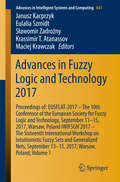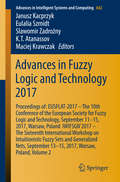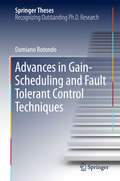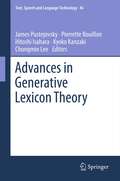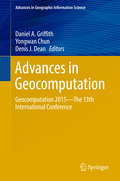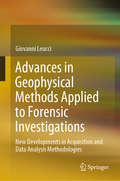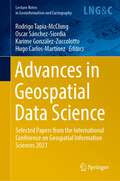- Table View
- List View
Advances in Enterprise Engineering XIII: 9th Enterprise Engineering Working Conference, EEWC 2019, Lisbon, Portugal, May 20–24, 2019, Revised Papers (Lecture Notes in Business Information Processing #374)
by David Aveiro Giancarlo Guizzardi José BorbinhaThis book constitutes the proceedings of the 9th Enterprise Engineering Working Conference, EEWC 2019, held in Lisbon, Portugal, May 2019. EEWC aims at addressing the challenges that modern and complex enterprises are facing in a rapidly changing world. The participants of the working conference share a belief that dealing with these challenges requires rigorous and scientific solutions, focusing on the design and engineering of enterprises. The goal of EEWC is to stimulate interaction between the different stakeholders, scientists as well as practitioners, interested in making Enterprise Engineering a reality. The 8 full papers and 3 short papers presented in this volume were carefully reviewed and selected from 22 submissions. They were organized in topical sections on processes; DEMO; models and enterprise architecture; and blockchain.
Advances in Enterprise Engineering XIV: 10th Enterprise Engineering Working Conference, EEWC 2020, Bozen-Bolzano, Italy, September 28, October 19, and November 9–10, 2020, Revised Selected Papers (Lecture Notes in Business Information Processing #411)
by David Aveiro Giancarlo Guizzardi Robert Pergl Henderik A. ProperThis book constitutes the proceedings of the 10th Enterprise Engineering Working Conference, EEWC 2020, which was planned to take place in Bozen-Bolzano, Italy, and had to change to an online event due to the COVID 19 pandemic. The online event took place on September 28, 2020, October 19, 2020, and November 9–10, 2020.EEWC aims at addressing the challenges that modern and complex enterprises are facing in a rapidly changing world. The participants of the working conference share a belief that dealing with these challenges requires rigorous and scientific solutions, focusing on the design and engineering of enterprises. The goal of EEWC is to stimulate interaction between the different stakeholders, scientists as well as practitioners, interested in making Enterprise Engineering a reality. The 8 full papers and 2 short papers presented in this volume were carefully reviewed and selected from 23 submissions. The volume also contains 3 keynote papers in full paper length. The papers were organized in topical sections as follows: formal approaches and modeling; the DEMO modeling language; and enterprise engineering practice.
Advances in Enterprise Engineering XV: 11th Enterprise Engineering Working Conference, EEWC 2021, Virtual Event, November 12, 2021, and December 16–17, 2021, Revised Selected Papers (Lecture Notes in Business Information Processing #441)
by David Aveiro Henderik A. Proper Sérgio Guerreiro Marne De VriesThis book constitutes the proceedings of the 11th Enterprise Engineering Working Conference, EEWC 2021, which was held online on November 12, 2021, and December 16-17, 2021.EEWC aims at addressing the challenges that modern and complex enterprises are facing in a rapidly changing world. The participants of the working conference share a belief that dealing with these challenges requires rigorous and scientific solutions, focusing on the design and engineering of enterprises. The goal of EEWC is to stimulate interaction between the different stakeholders, scientists as well as practitioners, interested in making Enterprise Engineering a reality. The 5 full papers and 3 short papers presented in this volume were carefully reviewed and selected from 16 submissions. The volume also contains 2 keynote papers.
Advances in Enterprise Engineering XVI: 12th Enterprise Engineering Working Conference, EEWC 2022, Leusden, The Netherlands, November 2–3, 2022, Revised Selected Papers (Lecture Notes in Business Information Processing #473)
by Cristine Griffo Sérgio Guerreiro Maria E. IacobThis book constitutes the refereed proceedings of the 12th Enterprise Engineering Working Conference on Advances in Enterprise Engineering XVI, EEWC 2022, held in Leusden, The Netherlands, November 2–3, 2022. EEWC aims at addressing the challenges that modern and complex enterprises are facing in a rapidly changing world. The participants of the working conference share a belief that dealing with these challenges requires rigorous and scientific solutions, focusing on the design and engineering of enterprises. The goal of EEWC is to stimulate interaction between the different stakeholders, scientists as well as practitioners, interested in making Enterprise Engineering a reality. The 4 full papers and 2 short papers included in this book were carefully reviewed and selected from 13 submissions. In addition, there are 2 invited papers from keynote presentations. They were organized in topical sections as follows: Invited Papers from Keynote Presentations and Presented Papers.
Advances in Enterprise Engineering XVII: 13th Enterprise Design and Engineering Working Conference, EDEWC 2023, Vienna, Austria, November 28–29, 2023, Revised Selected Papers (Lecture Notes in Business Information Processing #510)
by Monika Malinova Mandelburger Sérgio Guerreiro Cristine Griffo David Aveiro Henderik A. Proper Marianne SchnellmannThis book constitutes the refereed proceedings of the 13th Enterprise Design and Engineering Working Conference on Advances in Enterprise Engineering XVII, EDEWC 2023, held in Vienna, Austria, during November 27–28, 2023. Enterprise design and engineering aims to take an integrative and engineering-oriented perspective to enterprise development management. As such, it considers enterprises as purposefully designed systems where all relevant aspects should be designed in coherence. The new scope of EDEWC reflects the rapid increase in digitization of enterprises in the last decade. This has resulted in a substantial change in the nature and structure of enterprises, which was the main focus of EDEWC 2023. The 5 full papers and 2 short papers included in this book were carefully reviewed and selected from 15 submissions.
Advances in Ergonomics in Design: Proceedings of the AHFE 2021 Virtual Conference on Ergonomics in Design, July 25-29, 2021, USA (Lecture Notes in Networks and Systems #261)
by Francisco RebeloThis book provides readers with a timely snapshot of ergonomics research and methods applied to the design, development and evaluation, of products, systems and services. It gathers theoretical contributions, case studies and reports on technical interventions focusing on a better understanding of human machine interaction, and user experience for improving product design. The book covers a wide range of established and emerging topics in user-centered design, relating to design for special populations, design education, workplace assessment and design, anthropometry, ergonomics of buildings and urban design, sustainable design, as well as visual ergonomics and interdisciplinary research and practices, among others. Based on the AHFE 2021 International Conference on Ergonomics in Design, held virtually on 25–29 July, 2021, from USA, the book offers a thought-provoking guide for both researchers and practitioners in human-centered design and related fields.
Advances in Ergonomics in Design: Proceedings of the AHFE 2020 Virtual Conference on Ergonomics in Design, July 16–20, 2020, USA (Advances in Intelligent Systems and Computing #1203)
by Francisco Rebelo Marcelo SoaresThis book provides readers with a timely snapshot of ergonomics research and methods applied to the design, development and prototyping—as well as the evaluation, training and manufacturing—of products, systems and services. Combining theoretical contributions, case studies and reports on technical interventions, it covers a wide range of topics in ergonomic design including ecological design; cultural and ethical aspects in design; interface design, user involvement and human–computer interaction in design; as well as design for accessibility and many others. The book particularly focuses on new technologies such as virtual reality, state-of-the-art methodologies in information design, and human–computer interfaces. Based on the AHFE 2020 Virtual Conference on Ergonomics in Design, held on July 10–16, 2020, the book offers a timely guide for both researchers and design practitioners, including industrial designers, human–computer interaction and user experience researchers, production engineers and applied psychologists.
Advances in Ergonomics in Design: Proceedings of the AHFE 2019 International Conference on Ergonomics in Design, July 24-28, 2019, Washington D.C., USA (Advances in Intelligent Systems and Computing #955)
by Francisco Rebelo Marcelo M. SoaresThis book provides readers with a timely snapshot of ergonomics research and methods applied to the design, development and prototyping – as well as the evaluation, training and manufacturing – of products, systems and services. Combining theoretical contributions, case studies, and reports on technical interventions, it covers a wide range of topics in ergonomic design including: ecological design; cultural and ethical aspects in design; Interface design, user involvement and human–computer interaction in design; as well as design for accessibility and many others. The book particularly focuses on new technologies such as virtual reality, state-of-the-art methodologies in information design, and human–computer interfaces. Based on the AHFE 2019 International Conference on Ergonomics in Design, held on July 24-28, 2019, Washington D.C., USA, the book offers a timely guide for both researchers and design practitioners, including industrial designers, human–computer interaction and user experience researchers, production engineers and applied psychologists.
Advances in Ergonomics in Design: Proceedings of the AHFE 2018 International Conference on Ergonomics in Design, July 21-25, 2018, Loews Sapphire Falls Resort at Universal Studios, Orlando, Florida, USA (Advances in Intelligent Systems and Computing #777)
by Marcelo M. Soares Francisco RebeloThis book provides readers with a timely snapshot of ergonomics research and methods applied to the design, development and prototyping – as well as the evaluation, training and manufacturing – of products, systems and services. Combining theoretical contributions, case studies, and reports on technical interventions, it covers a wide range of topics in ergonomic design including: ecological design; educational and game design; cultural and ethical aspects in design; user research and human–computer interaction in design; as well as design for accessibility and extreme environments, and many others. The book particularly focuses on new technologies such as virtual reality, state-of-the-art methodologies in information design, and human–computer interfaces. Based on the AHFE 2018 International Conference on Ergonomics in Design, held on July 21–25, 2018, in Orlando, Florida, USA, the book offers a timely guide for both researchers and design practitioners, including industrial designers, human–computer interaction and user experience researchers, production engineers and applied psychologists.
Advances in Evolutionary and Deterministic Methods for Design, Optimization and Control in Engineering and Sciences (Computational Methods in Applied Sciences #48)
by Edmondo Minisci Massimiliano Vasile Jacques Periaux Nicolas R. Gauger Kyriakos C. Giannakoglou Domenico QuagliarellaThis volume presents up-to-date material on the state of the art in evolutionary and deterministic methods for design, optimization and control with applications to industrial and societal problems from Europe, Asia, and America.EUROGEN 2015 was the 11th of a series of International Conferences devoted to bringing together specialists from universities, research institutions and industries developing or applying evolutionary and deterministic methods in design optimization, with emphasis on solving industrial and societal problems. The conference was organised around a number of parallel symposia, regular sessions, and keynote lectures focused on surrogate-based optimization in aerodynamic design, adjoint methods for steady & unsteady optimization, multi-disciplinary design optimization, holistic optimization in marine design, game strategies combined with evolutionary computation, optimization under uncertainty, topology optimization, optimal planning, shape optimization, and production scheduling.
Advances in Face Detection and Facial Image Analysis
by M. Emre Celebi Michal Kawulok Bogdan SmolkaThisbook presents the state-of-the-art in face detection and analysis. It outlinesnew research directions, including in particular psychology-based facialdynamics recognition, aimed at various applications such as behavior analysis,deception detection, and diagnosis of various psychological disorders. Topicsof interest include face and facial landmark detection, face recognition, facialexpression and emotion analysis, facial dynamics analysis, face classification,identification, and clustering, and gaze direction and head pose estimation, aswell as applications of face analysis.
Advances in Face Presentation Attack Detection (Synthesis Lectures on Computer Vision)
by Jun Wan Guodong Guo Sergio Escalera Hugo Jair Escalante Stan Z. LiThis book revises and expands upon the prior edition of Multi-Modal Face Presentation Attack Detection. The authors begin with fundamental and foundational information on face spoofing attack detection, explaining why the computer vision community has intensively studied it for the last decade. The authors also discuss the reasons that cause face anti-spoofing to be essential for preventing security breaches in face recognition systems. In addition, the book describes the factors that make it difficult to design effective methods of face presentation attack detection challenges. The book presents a thorough review and evaluation of current techniques and identifies those that have achieved the highest level of performance in a series of ChaLearn face anti-spoofing challenges at CVPR and ICCV. The authors also highlight directions for future research in face anti-spoofing that would lead to progress in the field. Additional analysis, new methodologies, and a more comprehensive survey of solutions are included in this new edition.
Advances in Feature Selection for Data and Pattern Recognition (Intelligent Systems Reference Library #138)
by Lakhmi C. Jain Urszula Stańczyk Beata ZieloskoThis book presents recent developments and research trends in the field of feature selection for data and pattern recognition, highlighting a number of latest advances. The field of feature selection is evolving constantly, providing numerous new algorithms, new solutions, and new applications. Some of the advances presented focus on theoretical approaches, introducing novel propositions highlighting and discussing properties of objects, and analysing the intricacies of processes and bounds on computational complexity, while others are dedicated to the specific requirements of application domains or the particularities of tasks waiting to be solved or improved. Divided into four parts - nature and representation of data; ranking and exploration of features; image, shape, motion, and audio detection and recognition; decision support systems, it is of great interest to a large section of researchers including students, professors and practitioners.
Advances in Financial Machine Learning
by Marcos Lopez de PradoMachine learning (ML) is changing virtually every aspect of our lives. Today ML algorithms accomplish tasks that until recently only expert humans could perform. As it relates to finance, this is the most exciting time to adopt a disruptive technology that will transform how everyone invests for generations. Readers will learn how to structure Big data in a way that is amenable to ML algorithms; how to conduct research with ML algorithms on that data; how to use supercomputing methods; how to backtest your discoveries while avoiding false positives. The book addresses real-life problems faced by practitioners on a daily basis, and explains scientifically sound solutions using math, supported by code and examples. Readers become active users who can test the proposed solutions in their particular setting. Written by a recognized expert and portfolio manager, this book will equip investment professionals with the groundbreaking tools needed to succeed in modern finance.
Advances in Fuzzy-Based Internet of Medical Things (IoMT)
by Satya Prakash Yadav Sudesh Yadav Pethuru Raj Chelliah Victor Hugo C. de AlbuquerqueADVANCES IN FUZZY-BASED INTERNET OF MEDICAL THINGS (IOMT) This book explores the latest trends, transitions, and advancements of the Internet of Medical Things whose integration through cloud-hosted software applications adds required intelligence from tools such as medical instruments, scanners, and appliances, enabling fuzzy logic to help medical professionals establish linguistic concepts in deciding diagnosis and prognosis. The main goal of the book is to strengthen medical professionals and caregivers by providing methods for achieving fuzzy logic-based health diagnosis and medication. The health condition and various physical parameters of humans, such as heartbeat rate, sugar level, blood pressure, temperature, and oxygen quality, are captured through a host of multifaceted sensors. Additionally, remote health monitoring, medication, and management are being facilitated through a host of ingestible sensors, 5G communication, networked embedded systems, AI models running on cloud servers and edge devices, etc. Furthermore, chronic disease management is another vital domain getting increased attention. The distinct advancements in the fuzzy logic field are useful in various advanced medical care functionalities and facilities. The readers will discover: new and innovative features of health care by using fuzzy logic that raises economic efficiency at macro and micro levels; expounds on fuzzy logic techniques used in medical science; describes the evolution of the fuzzy logic paradigm and how it helps physicians decide on diagnosis and prognosis; uncovers how trust management is dealt with between patients and medical officials to help advance the fuzzy logic field; provides case studies, various technology advancements, and practical aspects on the impacts and challenges of fuzzy-based Internet of Medical Things. Audience The book will be read and used by researchers in artificial intelligence, fuzzy logic, medical professionals, caregivers, health administrators, and policymakers.
Advances in Fuzzy Decision Making: Theory and Practice (Studies in Fuzziness and Soft Computing #333)
by Iwona Skalna Bogdan Rębiasz Bartłomiej Gaweł Beata Basiura Jerzy Duda Janusz Opiła Tomasz Pełech-PilichowskiThisbook shows how common operation management methods and algorithms can beextended to deal with vague or imprecise information in decision-makingproblems. It describes how to combine decision trees, clustering,multi-attribute decision-making algorithms and Monte Carlo Simulation with themathematical description of imprecise or vague information, and how tovisualize such information. Moreover, it discusses a broad spectrum ofreal-life management problems including forecasting the apparentconsumption of steel products, planning and scheduling of production processes,project portfolio selection and economic-risk estimation. It is a concise, yetcomprehensive, reference source for researchers in decision-making anddecision-makers in business organizations alike.
Advances in Fuzzy Group Decision Making (SpringerBriefs in Applied Sciences and Technology)
by Tin-Chih Toly ChenThis book is focused on fuzzy group decision making, offering technical details including methodology, collaboration and aggregation mechanisms, system architectures, and applications. It explores the two categories of fuzzy-group decision making - anterior-aggregation and posterior-aggregation – and highlights how imperative collaboration amongst decision makers is for both forms. Advances in Fuzzy Group Decision Making will be of interest to researchers in decision making, artificial intelligence, soft computing, operations management, and information management, as well as practicing managers and engineers.
Advances in Fuzzy Logic and Technology 2017: Proceedings of: EUSFLAT- 2017 – The 10th Conference of the European Society for Fuzzy Logic and Technology, September 11-15, 2017, Warsaw, Poland IWIFSGN’2017 – The Sixteenth International Workshop on Intuitionistic Fuzzy Sets and Generalized Nets, September 13-15, 2017, Warsaw, Poland, Volume 3 (Advances in Intelligent Systems and Computing #643)
by Krassimir T. Atanassov Janusz Kacprzyk Maciej Krawczak Eulalia Szmidt Slawomir ZadrożnyThis volume constitutes the proceedings of two collocated international conferences: EUSFLAT-2017 - the 10th edition of the flagship Conference of the European Society for Fuzzy Logic and Technology held in Warsaw, Poland, on September 11-15, 2017, and IWIFSGN'2017 - The Sixteenth International Workshop on Intuitionistic Fuzzy Sets and Generalized Nets, held in Warsaw on September 13-15, 2017. The conferences were organized by the Systems Research Institute, Polish Academy of Sciences, Department IV of Engineering Sciences, Polish Academy of Sciences, and the Polish Operational and Systems Research Society in collaboration with the European Society for Fuzzy Logic and Technology (EUSFLAT), the Bulgarian Academy of Sciences and various European universities. The aim of the EUSFLAT-2017 was to bring together theoreticians and practitioners working on fuzzy logic, fuzzy systems, soft computing and related areas and to provide a platform for exchanging ideas and discussing the l atest trends and ideas, while the aim of IWIFSGN'2017 was to discuss new developments in extensions of the concept of a fuzzy set, such as an intuitionistic fuzzy set, as well as other concepts, like that of a generalized net. The papers included, written by leading international experts, as well as the special sessions and panel discussions contribute to the development the field, strengthen collaborations and intensify networking.
Advances in Fuzzy Logic and Technology 2017: Proceedings of: EUSFLAT-2017 – The 10th Conference of the European Society for Fuzzy Logic and Technology, September 11–15, 2017, Warsaw, Poland IWIFSGN’2017 – The Sixteenth International Workshop on Intuitionistic Fuzzy Sets and Generalized Nets, September 13–15, 2017, Warsaw, Poland, Volume 1 (Advances in Intelligent Systems and Computing #641)
by Krassimir T. Atanassov Janusz Kacprzyk Sławomir Zadrożny Maciej Krawczak Eulalia SzmidtThis volume constitutes the proceedings of two collocated international conferences: EUSFLAT-2017 - the 10th edition of the flagship Conference of the European Society for Fuzzy Logic and Technology held in Warsaw, Poland, on September 11-15, 2017, and IWIFSGN'2017 - The Sixteenth International Workshop on Intuitionistic Fuzzy Sets and Generalized Nets, held in Warsaw on September 13-15, 2017. The conferences were organized by the Systems Research Institute, Polish Academy of Sciences, Department IV of Engineering Sciences, Polish Academy of Sciences, and the Polish Operational and Systems Research Society in collaboration with the European Society for Fuzzy Logic and Technology (EUSFLAT), the Bulgarian Academy of Sciences and various European universities. The aim of the EUSFLAT-2017 was to bring together theoreticians and practitioners working on fuzzy logic, fuzzy systems, soft computing and related areas and to provide a platform for exchanging ideas and discussing the l atest trends and ideas, while the aim of IWIFSGN'2017 was to discuss new developments in extensions of the concept of a fuzzy set, such as an intuitionistic fuzzy set, as well as other concepts, like that of a generalized net. The papers included, written by leading international experts, as well as the special sessions and panel discussions contribute to the development the field, strengthen collaborations and intensify networking.
Advances in Fuzzy Logic and Technology 2017: Proceedings of: EUSFLAT- 2017 – The 10th Conference of the European Society for Fuzzy Logic and Technology, September 11-15, 2017, Warsaw, Poland IWIFSGN’2017 – The Sixteenth International Workshop on Intuitionistic Fuzzy Sets and Generalized Nets, September 13-15, 2017, Warsaw, Poland, Volume 2 (Advances in Intelligent Systems and Computing #642)
by Janusz Kacprzyk Maciej Krawczak Eulalia Szmidt Slawomir Zadrożny K. T. AtanassovThis volume constitutes the proceedings of two collocated international conferences: EUSFLAT-2017 - the 10th edition of the flagship Conference of the European Society for Fuzzy Logic and Technology held in Warsaw, Poland, on September 11-15, 2017, and IWIFSGN'2017 - The Sixteenth International Workshop on Intuitionistic Fuzzy Sets and Generalized Nets, held in Warsaw on September 13-15, 2017. The conferences were organized by the Systems Research Institute, Polish Academy of Sciences, Department IV of Engineering Sciences, Polish Academy of Sciences, and the Polish Operational and Systems Research Society in collaboration with the European Society for Fuzzy Logic and Technology (EUSFLAT), the Bulgarian Academy of Sciences and various European universities. The aim of the EUSFLAT-2017 was to bring together theoreticians and practitioners working on fuzzy logic, fuzzy systems, soft computing and related areas and to provide a platform for exchanging ideas and discussing the l atest trends and ideas, while the aim of IWIFSGN'2017 was to discuss new developments in extensions of the concept of a fuzzy set, such as an intuitionistic fuzzy set, as well as other concepts, like that of a generalized net. The papers included, written by leading international experts, as well as the special sessions and panel discussions contribute to the development the field, strengthen collaborations and intensify networking.
Advances in Gain-Scheduling and Fault Tolerant Control Techniques (Springer Theses)
by Damiano RotondoThis thesis reports on novel methods for gain-scheduling and fault tolerant control (FTC). It begins by analyzing the connection between the linear parameter varying (LPV) and Takagi-Sugeno (TS) paradigms. This is then followed by a detailed description of the design of robust and shifting state-feedback controllers for these systems. Furthermore, it presents two approaches to fault-tolerant control: the first is based on a robust polytopic controller design, while the second involves a reconfiguration of the reference model and the addition of virtual actuators into the loop. Inaddition the thesis offers a thorough review of the state-of-the art in gain scheduling and fault-tolerant control, with a special emphasis on LPV and TS systems.
Advances in Generative Lexicon Theory (Text, Speech and Language Technology #46)
by James Pustejovsky Pierrette Bouillon Kyoko Kanzaki Chungmin Lee Hitoshi IsaharaThis collection of papers takes linguists to the leading edge of techniques in generative lexicon theory, the linguistic composition methodology that arose from the imperative to provide a compositional semantics for the contextual modifications in meaning that emerge in real linguistic usage. Today's growing shift towards distributed compositional analyses evinces the applicability of GL theory, and the contributions to this volume, presented at three international workshops (GL-2003, GL-2005 and GL-2007) address the relationship between compositionality in language and the mechanisms of selection in grammar that are necessary to maintain this property. The core unresolved issues in compositionality, relating to the interpretation of context and the mechanisms of selection, are treated from varying perspectives within GL theory, including its basic theoretical mechanisms and its analytical viewpoint on linguistic phenomena.
Advances in Geocomputation: Geocomputation 2015--The 13th International Conference (Advances in Geographic Information Science)
by Daniel A. Griffith Yongwan Chun Denis J. DeanThis book contains refereed papers from the 13th International Conference on GeoComputation held at the University of Texas, Dallas, May 20-23, 2015. Since 1996, the members of the GeoComputation (the art and science of solving complex spatial problems with computers) community have joined together to develop a series of conferences in the United Kingdom, New Zealand, Australia, Ireland and the United States of America. The conference encourages diverse topics related to novel methodologies and technologies to enrich the future development of GeoComputation research.
Advances in Geophysical Methods Applied to Forensic Investigations: New Developments in Acquisition and Data Analysis Methodologies
by Giovanni LeucciThis book provides a general introduction to the most important geophysical exploration methods and their application to forensic sciences. It describes physical principles, campaign procedures and processing, as well as interpretation techniques, while also highlighting new acquisition and data analysis procedures. A large section of the book is devoted to applications, from measurements to the interpretation of data. Further, the book shows how to design and perform a forensic survey, and offers guidance on selecting the best method for the problem at hand, and on selecting the best type of data acquisition and processing. Written in straightforward language and chiefly intended as an introductory text for students in several scientific fields, the book also offers a useful guide for specialists who want to expand their expertise in this fascinating discipline.
Advances in Geospatial Data Science: Selected Papers from the International Conference on Geospatial Information Sciences 2021 (Lecture Notes in Geoinformation and Cartography)
by Rodrigo Tapia-McClung Oscar Sánchez-Siordia Karime González-Zuccolotto Hugo Carlos-MartínezThis book presents a selection of manuscripts submitted to the 2nd International Conference on Geospatial Information Sciences 2021, a virtual conference held on November 3-5, 2021. These papers were selected by the Scientific Program Committee of the Conference after a rigorous peer-review process. They represent the vast scope of the interdisciplinary research areas that characterize the Geospatial Information Sciences that is done in the discipline. It especially represents a fabulous opportunity to showcase research carried out by young Mexican researchers and showcase it to the rest of the world and enhance the growth of the sciences in the country while, at the same time, enforces them to level up with other research at the international level.
